

Stages of Adolescence. By: Brittany Allen, MD, FAAP & Helen Waterman, DO Adolescence is the period of transition between childhood and adulthood.
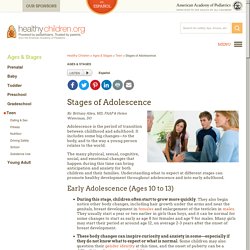
It includes some big changes—to the body, and to the way a young person relates to the world. The Growing Child- Teenager (13 to 18 Years) How much will my teen grow?

The teenage years are also called adolescence. This is a time for growth spurts and puberty changes (sexual maturation). B.F. Skinner Operant Conditioning (Full video) Operant Conditioning in Disney Movies. Understanding Reinforcement vs. Punishment – Parenting With Psychology. I simply cannot blog another week without covering reinforcement and punishment.
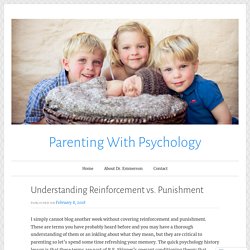
These are terms you have probably heard before and you may have a thorough understanding of them or an inkling about what they mean, but they are critical to parenting so let’s spend some time refreshing your memory. The quick psychology history lesson is that these terms are part of B.F. Reinforcement and Punishment: Examples & Overview. The power of reinforcement and punishment to change behavior was discovered by B.F.
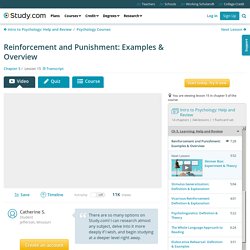
Skinner. Read on to learn about Skinner's discoveries and how you may experience reinforcement and punishment in your own life. B.F. Skinner and Operant Conditioning The effects of reinforcement and punishment were discovered by B.F. Positive/Negative Reinforcement/Punishment - Quiz. Positive vs. Negative Reinforcement: A Guide for Parents – Generation Mindful. I almost stopped bringing them to the playground.
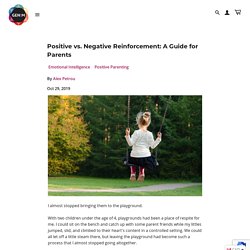
With two children under the age of 4, playgrounds had been a place of respite for me. I could sit on the bench and catch up with some parent friends while my littles jumped, slid, and climbed to their heart's content in a controlled setting. We could all let off a little steam there, but leaving the playground had become such a process that I almost stopped going altogether.
Positive Reinforcement - The Big Bang Theory. Negative reinforcement: Definition and examples. Negative reinforcement encourages specific behaviors by removing or avoiding negative consequences or stimuli.

It is different than punishment, which aims to discourage a specific behavior. Negative reinforcement has become a popular way of encouraging good behavior at school. How Reinforcement Schedules Work. Operant conditioning is a learning process in which new behaviors are acquired and modified through their association with consequences.
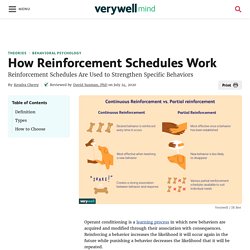
Reinforcing a behavior increases the likelihood it will occur again in the future while punishing a behavior decreases the likelihood that it will be repeated. In operant conditioning, schedules of reinforcement are an important component of the learning process. What is Positive Punishment? How Negative Punishment Works. Negative punishment is an important concept in B.
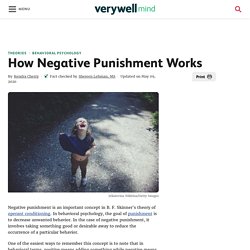
F. Skinner's theory of operant conditioning. In behavioral psychology, the goal of punishment is to decrease unwanted behavior. Positive Punishment: What It Is, Benefits, and Examples. Positive punishment is a form of behavior modification.
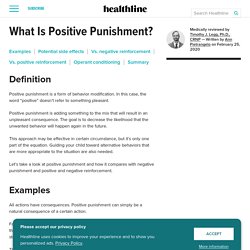
In this case, the word “positive” doesn’t refer to something pleasant. Positive punishment is adding something to the mix that will result in an unpleasant consequence. The goal is to decrease the likelihood that the unwanted behavior will happen again in the future. This approach may be effective in certain circumstance, but it’s only one part of the equation. Guiding your child toward alternative behaviors that are more appropriate to the situation are also needed. A summary of Positive & Negative Punishment. How to Reward Your Teen for Good Behavior. Teenagers are young adults who are trying to learn the ways of the world.
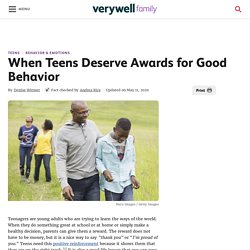
When they do something great at school or at home or simply make a healthy decision, parents can give them a reward. The reward does not have to be money, but it is a nice way to say "thank you" or "I'm proud of you. " Teens need this positive reinforcement because it shows them that they are on the right track.1 It is also a good life lesson that you can pass on: good things happen to good people. When Do Teenagers Deserve a Reward? A teen can earn a reward for positive behavior or by changing negative behavior.1 While you should not feel that you have to "pay" for every good thing your teen does, reinforcement of good behavior will help ensure that it continues.
Parenting A Teen Through Positive Reinforcement - Back On Track. Most parents can agree: the teenage years can be rough! Hormones are raging, they are trying to gain more independence, and they spend a lot of time away from their parents and their home while hanging with friends. One minute they love and adore you, the next minute you ruined their life. Creating a token economy. Discipline strategies for teenagers. Teenage discipline: the basics Discipline isn’t about punishment. It’s about teaching children appropriate ways to behave. For teenagers, discipline is about agreeing on and setting appropriate limits and helping them behave within those limits.
When your child was younger, you probably used a range of discipline strategies to teach him the basics of good behaviour. Now your child is growing into a teenager, you can use limits and boundaries to help him learn independence, take responsibility for his behaviour and its outcomes, and solve problems. Discipline for Teens: Strategies and Challenges. When your child becomes a teenager, your parenting role is likely to shift.
You may find yourself becoming more of a guide, rather than an enforcer. That’s not to say your child won’t need you to intervene when there are safety issues or that your teen won’t need consequences. But, by now, it’s OK to let your child make some choices on their own, even when you think it’s a bad choice. Typical Teen Behavior Teens like to test the limits of their independence.1 So don’t be surprised when your teen argues with you when you say no, or when they go behind your back to do as they please.
12 Examples of Positive Punishment & Negative Reinforcement. You might be thinking that “positive punishment” sounds like an oxymoron, after all, how can punishment be positive? Not many people “like” punishment, right? The disconnect in understanding this concept comes from the usage of the word “positive;” here at PositivePsychology.com, we generally use the term “positive” to refer to things that are inherently good, things that are life-giving, and things that promote thriving and flourishing.
10 Positive Punishment Techniques & Their Effect. By: Ashley Brown Updated February 11, 2021 Medically Reviewed By: Laura Angers. Being a Diligent Parent - Focus on the Family. Parenting Quote 637. Parenting quote.